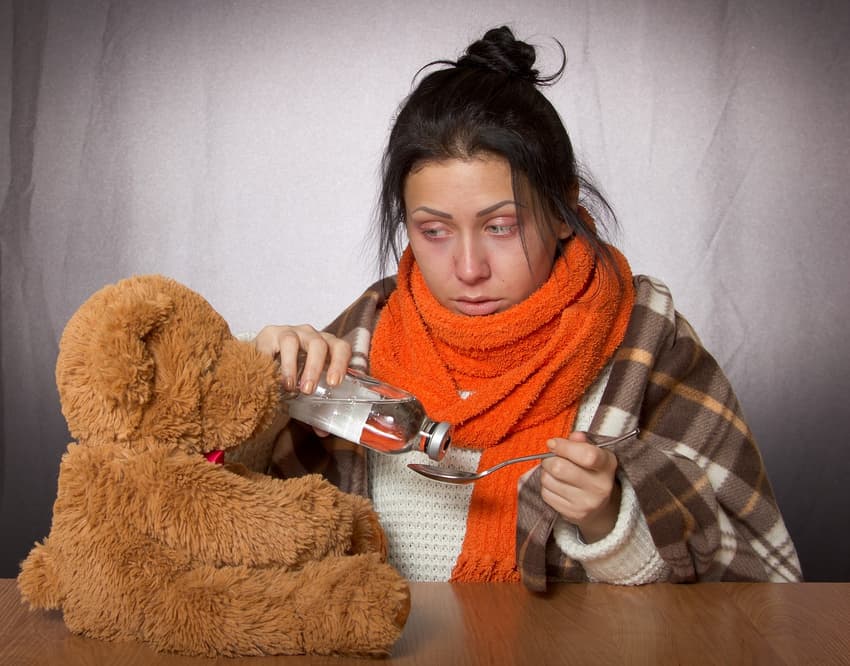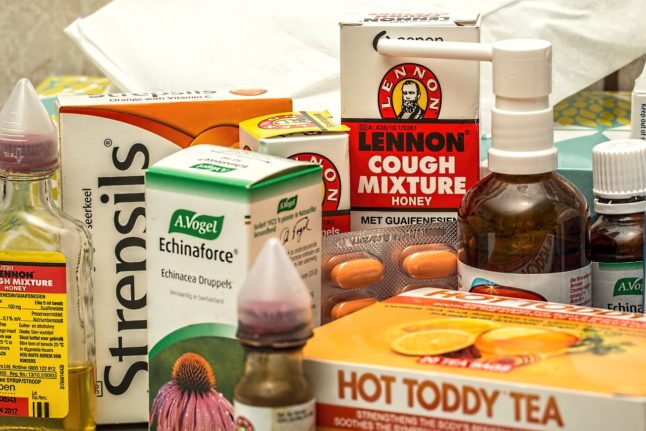Five ways to fight colds and flu like a true Swiss

‘Tis the season when various contagious viruses circulate in the air, infecting those who happen to be in the path of a cough or a sneeze. But just how do the Swiss treat these ailments?
Flu and other respiratory viruses have been particularly invasive in the past weeks, causing major problems in Switzerland this winter.
“We are expecting a stronger flu wave," said Huldrych Günthard, an infectiologist at the University Hospital in Zurich, adding that doctors are expecting “above-average number of severe flu cases".
And Michel Matter, president of the Association of Doctors of the Canton of Geneva, added that "we have the impression that everyone is getting sick, and hospital emergency services are submerged.”
READ MORE: EXPLAINED: The Swiss regions being hit hardest by the flu wave
So how do the Swiss treat these illnesses?
Swiss flu sufferers are not that different from their counterparts in other countries. It is not uncommon to see a variety of medications on the bedside table: a nose spray, throat lozenges, as well as fever-reducing and anti-inflammatory medication.

A typical array of flu treatments. Image by Steve Buissinne from Pixabay
Generally speaking — and this is not a strictly Swiss characteristic — some people go through the flu and cold stoically (primarily women), while others whine a lot (mostly men).
The treatment they rely on can be divided into two categories (for both stoics and whiners): mainstream or alternative medicine.
The latter is very popular in Switzerland, especially since homeopathy is covered by the compulsory KVG / LaMal insurance, and other alternative treatments are paid for by supplemental policies.
READ MORE: Should you buy supplemental health insurance in Switzerland?
However, the Swiss believe in, and revert to, some treatments more than to others.
These are some (both conventional and not) that the Swiss are particularly fond of, based on anecdotal and observational evidence:
Oscillococcinum
You may not be able to pronounce it, but this anti-flu homeopathic treatment is nothing to sneeze at.
In fact, many Swiss keep these disolvable “granules” in their homes and take them at the first sign of the flu.
Some people swear by Oscillococcinum’s effectiveness, some say it is just hokum, while others are, in a true Swiss fashion, neutral on the subject.
Nasal “bath”
Spoiler alert: this is not an attractive sight for anyone watching the process, but many people, especially of the older generation, truly believe that washing out their stuffed noses with a saline solution delivered through a special contraption allows them to breathe easier.
Inhalation
When a cold causes chest congestion, many Swiss take out a small washbasin, fill it with hot water and eucalyptus oil, cover their heads with a towel, and inhale the liquid.
Other than a risk of burns if the scalding water should spill on any body part, the treatment is believed to be quite effective.
Hot water bottle
While it doesn’t cure the flu, or even relieve its symptoms, the hot water bottle provides comfort to the patient by keeping their feet and other body parts toasty warm.

Hot water bottle provides comfort. Image by alsterkoralle from Pixabay
Anti-flu drink
Whether it is a cup of hot tea with honey and lemon or its medical alternative (like NeoCitran), many people like the soothing / decongesting effects these hot drinks have on their sore throats and stuffed noses.
Do you have a special flu / cold cure of your own? Share it with us here.
Comments
See Also
Flu and other respiratory viruses have been particularly invasive in the past weeks, causing major problems in Switzerland this winter.
“We are expecting a stronger flu wave," said Huldrych Günthard, an infectiologist at the University Hospital in Zurich, adding that doctors are expecting “above-average number of severe flu cases".
And Michel Matter, president of the Association of Doctors of the Canton of Geneva, added that "we have the impression that everyone is getting sick, and hospital emergency services are submerged.”
READ MORE: EXPLAINED: The Swiss regions being hit hardest by the flu wave
So how do the Swiss treat these illnesses?
Swiss flu sufferers are not that different from their counterparts in other countries. It is not uncommon to see a variety of medications on the bedside table: a nose spray, throat lozenges, as well as fever-reducing and anti-inflammatory medication.

A typical array of flu treatments. Image by Steve Buissinne from Pixabay
Generally speaking — and this is not a strictly Swiss characteristic — some people go through the flu and cold stoically (primarily women), while others whine a lot (mostly men).
The treatment they rely on can be divided into two categories (for both stoics and whiners): mainstream or alternative medicine.
The latter is very popular in Switzerland, especially since homeopathy is covered by the compulsory KVG / LaMal insurance, and other alternative treatments are paid for by supplemental policies.
READ MORE: Should you buy supplemental health insurance in Switzerland?
However, the Swiss believe in, and revert to, some treatments more than to others.
These are some (both conventional and not) that the Swiss are particularly fond of, based on anecdotal and observational evidence:
Oscillococcinum
You may not be able to pronounce it, but this anti-flu homeopathic treatment is nothing to sneeze at.
In fact, many Swiss keep these disolvable “granules” in their homes and take them at the first sign of the flu.
Some people swear by Oscillococcinum’s effectiveness, some say it is just hokum, while others are, in a true Swiss fashion, neutral on the subject.
Nasal “bath”
Spoiler alert: this is not an attractive sight for anyone watching the process, but many people, especially of the older generation, truly believe that washing out their stuffed noses with a saline solution delivered through a special contraption allows them to breathe easier.
Inhalation
When a cold causes chest congestion, many Swiss take out a small washbasin, fill it with hot water and eucalyptus oil, cover their heads with a towel, and inhale the liquid.
Other than a risk of burns if the scalding water should spill on any body part, the treatment is believed to be quite effective.
Hot water bottle
While it doesn’t cure the flu, or even relieve its symptoms, the hot water bottle provides comfort to the patient by keeping their feet and other body parts toasty warm.

Anti-flu drink
Whether it is a cup of hot tea with honey and lemon or its medical alternative (like NeoCitran), many people like the soothing / decongesting effects these hot drinks have on their sore throats and stuffed noses.
Do you have a special flu / cold cure of your own? Share it with us here.
Join the conversation in our comments section below. Share your own views and experience and if you have a question or suggestion for our journalists then email us at [email protected].
Please keep comments civil, constructive and on topic – and make sure to read our terms of use before getting involved.
Please log in here to leave a comment.